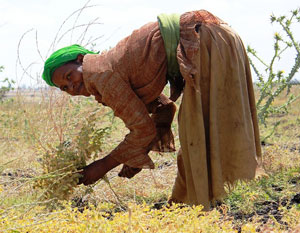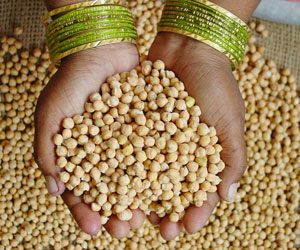

Profiting from the private sector – so seeds meet needs
October 15, 2014
New Alliance marks World Food Day with drive to transform African farming
World Food Day, October 16. The Alliance for Agricultural R&D for Food Security today announced its first project. It aims to ensure that new crop varieties better meet the needs of African smallholders and their customers. The official launch took place at the World Food Prize meeting in Iowa, USA.
The new initiative brings together the Australian International Food Security Research Centre (AIFSRC) in the Australian Centre for International Agricultural Research (ACIAR), the Syngenta Foundation for Sustainable Agriculture (SFSA) and the Crawford Fund. Speaking in connection with the launch, SFSA Director Dr Marco Ferroni emphasized: “Progressing research and breeding results through to millions of smallholders is essential. Today, plant science often fails to create impact at scale. However, solutions are within reach, and the private sector plays a central role.”
 The Alliance will work with African partners to encourage market development, economic growth and investment in plant breeding programs. “Our organizations share important common goals, and want to help more smallholders adopt high-yielding seeds and other agricultural technology”, says AIFSRC Director Mellissa Wood. “We believe that by teaming up we can achieve better outcomes for smallholders than if we worked separately.” The University of Queensland’s Global Change Institute (UQ/GCI) is managing the project.
The Alliance will work with African partners to encourage market development, economic growth and investment in plant breeding programs. “Our organizations share important common goals, and want to help more smallholders adopt high-yielding seeds and other agricultural technology”, says AIFSRC Director Mellissa Wood. “We believe that by teaming up we can achieve better outcomes for smallholders than if we worked separately.” The University of Queensland’s Global Change Institute (UQ/GCI) is managing the project.
“Historically, African smallholders have been slow to use new plant varieties,” notes Dr Yemi Akinbamijo, Executive Director of the Forum for Agricultural Research in Africa (FARA). “The adoption rate for most food crops is below 30 per cent, way behind Asia or South America.” There are several reasons for the slow uptake. They include lack of access to information, credit and the new seeds themselves. “However, another important question is how well the seeds satisfy market demand,” adds Project co-leader Dr Gabrielle Persley from UQ/GCI. “Farmers will only grow varieties that meet their own needs and those of traders, processors and consumers.”

The Alliance aims to ensure that demand in the marketplace guides research and development (R&D) more strongly than in the past. “Our project will harness new ideas and best practices from both the public and private sectors,” says Project co-leader Dr Vivienne Anthony from SFSA. “Private companies know the value of demand-led R&D; we plan to encourage public breeding programs to benefit from their experiences and expertise.
Better information and demand-led R&D will accelerate the transformation of African agriculture, raise smallholders’ incomes and improve food security. The Alliance will distribute project outputs broadly across Sub-Saharan Africa through existing public plant breeding and education programs, including the University sector. “We also aim to provide strong evidence to support new policy development and investment,” declares Dr Denis Blight, Executive Director of the Crawford Fund.
“Farming in Africa is today at a crossroads,” says project partner, Dr Appolinaire Djikeng, Director of Biosciences eastern and central Africa (BecA) in Nairobi. “Projects such as this are crucial to ensure food security, self-reliance, diversity of diet and economic growth across the farming communities.”
Partners in the Alliance for Agricultural R&D for Food Security
The AIFSRC is an entity established by the Australian Government in the Australian Centre for International Agricultural Research (ACIAR) to accelerate the delivery of research innovations for food security. The AIFSRC aims to support research to accelerate the uptake of new technologies; and understanding and resolving constraints to dissemination and adoption of new technologies. It has a focus on exploring different partnership models to achieve effective implementation, delivery and communication of the adoption of agricultural research for development.
The Crawford Fund is a Canberra based entity whose purpose is to make more widely known the benefits that accrue both to Australia and the developing world from investment in international agricultural research and development. The CF conducts public awareness activities, commissions studies on research policy and practice issues related to its mission and arranges specialist training activities in Australia and abroad for developing country scientists.
The Syngenta Foundation for Sustainable Agriculture is a non-profit organisation based in Basel, Switzerland. Its mission is to create value for small farmers in developing countries by supporting innovation in sustainable agriculture and activation of value chains. It works with a wide range of partners operationally and in thought leadership. SFSA engages, for example, the public sector, international organizations, think tanks, the private sector, other foundations, social entrepreneurs, and non-governmental organizations (NGOs). As well as establishing pilot projects, the Foundation also puts major emphasis on successful scale-up.
Program Manager
The Global Change Institute at The University of Queensland, Australia, is an independent source of game-changing research, ideas and advice for addressing the challenges of global change. GCI advances discovery, creates solutions and advocates responses that meet the challenges presented by climate change, technological innovation and population change. Measured through a combination of three key global university rankings, UQ is currently ranked in the top 100 of all universities worldwide and is a founding member of the national Group of Eight (Go8) universities.




